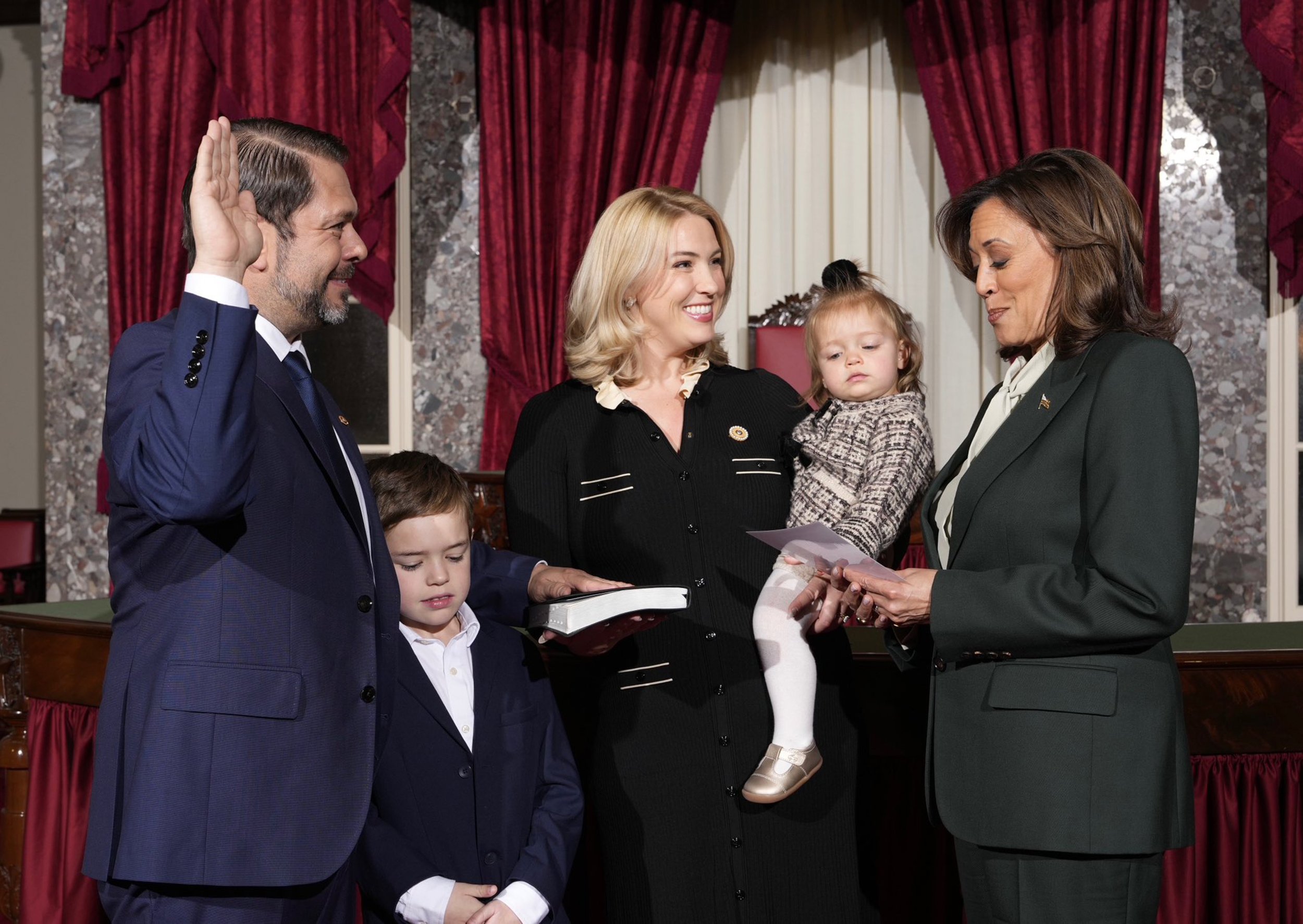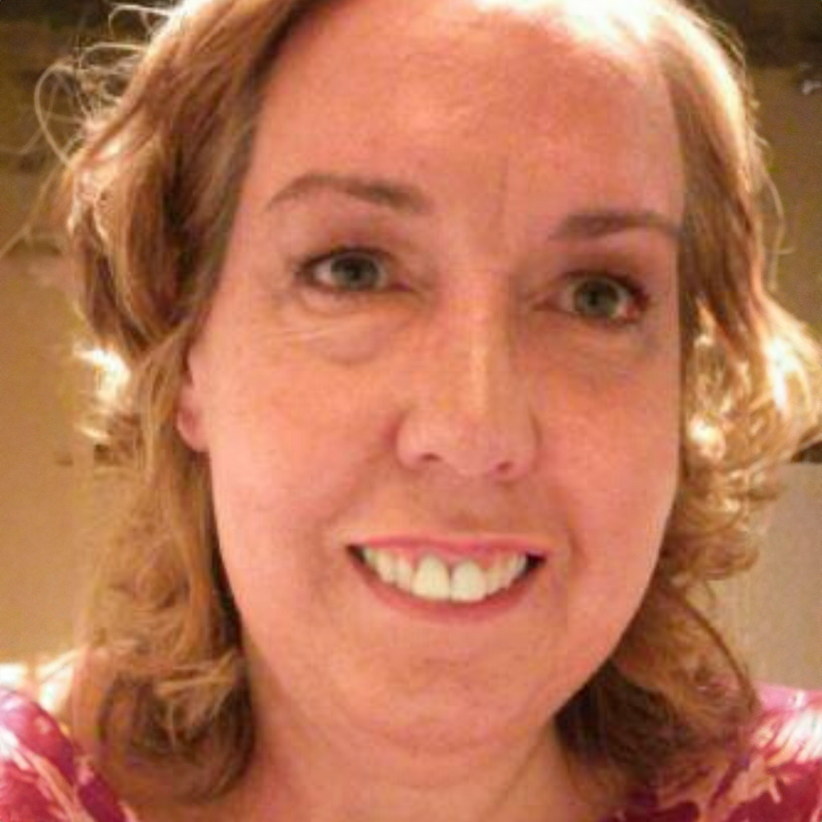Senator Ruben Gallego: A Community Win through the Lens of Veteran and Immigrant Communities
Sen. Ruben Gallego with his family during a ceremonial swearing-in ceremony by Vice President Kamala Harris in the Old Senate Chamber at the U.S. Capitol on January 3, 2025. Photo courtesy of Ruben Gallego, via X
Gallego’s path to the U.S. Senate was on a road paved by more than a decade of organizing and battles that continue to test Arizona’s political left.
Editor’s note: This coverage was made possible by a grant through the URL Collective, a nonprofit supporting local, diverse media. palabra and URL Collective have partnered to bring you election reporting from grassroots media.
On election night back in November, Marine veteran and Democratic representative Ruben Gallego stepped on stage. He confidently said to cheering fans, “I believe that when all those ballots are counted, and every Arizonan vote is counted, a poor Latino boy who grew up sleeping on the floor will be headed to the floor of the United States Senate. The first Latino senator in Arizona history…. My name is Ruben Gallego. I'm a husband, a congressman, and a Marine.” Six days later, on Veterans Day, the race was called for him, with just over 50% of the vote. Many media outlets and Arizona voters closely followed the race between Gallego and Trump-backed Kari Lake. While Arizona went red and contributed to President-elect Donald Trump’s win, an overlay of the presidential and Senate races reveals one outlier: Maricopa County, which has seen the Latino community grow faster than any other group. In 2022, Latinos comprised more than 1.5 million of the county’s 4.5 million population. In last year’s Senate race, the county went blue and elected Arizona’s first Latino to the country’s upper chamber. Some viewed Gallego’s race as a key to understanding and engaging the shifting electoral and demographic landscape.
Gallego, of Colombian and Mexican descent, was born and raised on the South Side of Chicago by a single mother. He was the first in his family to go to college, attending Harvard before joining the Marines and serving for four years. Gallego has said he moved to Arizona looking for a fresh start. He decided to run for elected office after serving as chief of staff to Phoenix City Council member Michael Nowakowski. He was first elected to state office in 2010 during an anti-immigrant climate reflected by the passage and aftermath of SB 1070, legislation that stated as its purpose “attrition through enforcement … to discourage and deter the unlawful entry and presence of aliens and economic activity by persons unlawfully present in the United States.” Political scientists point to SB 1070 as one of the most anti-immigrant pieces of state legislation in the country. SB 1070 also created a legal means of racially profiling anyone suspected of entering the country without legal documents. In Arizona, this meant law enforcement could apply a broad definition of reasonable suspicion to target Latinos for questioning.
Gallego joined a diverse coalition of groups fighting SB 1070. He founded Citizens for Professional Law Enforcement to recall then-Sheriff Joe Arpaio, the bill’s supporter and enforcer. Arpaio overcame the recall efforts and remained in office until 2016. In 2020, when deciding whether to run for the U.S. Senate, Gallego reflected on that time. “The children of SB 1070 ten years later grew to change Arizona. You tried to bury us; you didn’t know we were seeds, and we would grow to fight for Arizona,” he posted on Twitter at the time. DACA recipient Antonio Valdovinos was with Gallego the day the Senate results became official. “Everybody went to the American Legion, and it was just a really intense moment. Twelve years of friendship and work and inspiration and to see him become a U.S. senator reinforced that this journey was worth the sacrifice, to push to get folks elected to, to get folks to actually participate in their own community elections, whether that was Congress or school board,” he told palabra.
Antonio Valdovinos, right, and his brother, with Ruben Gallego, center, at Gallego’s victory speech event. Photo courtesy of Antonio Valdovinos
Valdovinos first met Gallego during the fight against SB 1070. Both worked to elect state Representative Daniel Valenzuela. At that time, Gallego was a freshman member of the Arizona State House and Valdovinos says his desire to get involved with the Democratic Party stemmed from the passage of Prop. 300 in 2006, which didn’t allow in-state tuition to students without documents, even if they graduated from an Arizona high school. “I ended up in politics out of wanting to join the fight for my future,” says Valdovinos. Gallego and Valdovinos were paired to canvas for state House candidate Valenzuela. “That was the first time I was truly inspired by him (Gallego) as a person.… He was a Marine. He had served in Lima Company 325, one of the most legendary Marine outfits that had been deployed in Iraq. For me, he was a big hero, to be in front of an infantry Marine.”
In his book, “They Called Us ‘Lucky’,” Gallego describes his combat unit, “Lucky Lima,” a remarkable group that, for a time under heavy fighting in the spring of 2005, went weeks without casualties.
In his first run for public office, Gallego became the first Latino Marine veteran elected to the state House. Valdovinos became Gallego’s field director during Gallego’s run for Congress in 2014. He would engage, organize, and mobilize in communities to get Latinos who had never participated in an election process to cast their ballot.
“We were sitting on the second-worst performing district in the United States Congress … We mobilized like crazy. It was just students from all sorts of walks of life that were there to see a young Latino become our congressman,” says Valdovinos.
Students mobilizing for Gallego said they were driven by a need for representation amid policy attacks like SB 1070 and figures like Maricopa County Sheriff Joe Arpaio. “There was just so much fear in communities,” says Valdovinos. After Gallego’s first congressional win, Valdovinos left to open his own political consulting firm, La Machine Consulting, to continue to mobilize and empower communities to drive positive change.
He says he was in many ways inspired by Gallego. “When I first met him in 2011, he was the only elected official who was literally walking in the summer with us … A lot of people would come and give us a speech, motivate us … but Ruben was the only elected official who literally picked up a list day after day and would go out there for four, six hours in the summer and knock on doors to help people know what was going on with the year's election.”
Antonio Valdovinos, left, with political consultant Patrick Barrett and Ruben Gallego in Washington, D.C., in 2015 for Gallego’s congressional swearing-in ceremony. Photo courtesy of Antonio Valdovinos
Once he arrived in Congress, Gallego introduced legislation and other measures supporting veterans and immigrants. In 2016, he sponsored a bill that would allow deported veterans who have not been convicted of felonies or serious misdemeanors to apply for legal respite to return to the U.S. In 2022, he introduced a bill allowing DACA recipients to join the military. Neither bill has passed, and both would have to be reintroduced in this new congressional session to be considered.
As a DACA recipient, Valdovinos sees Gallegos’ Senate win as critical for immigrant communities at a moment when measures like Prop. 314, a bill similar to SB 1070, and President-elect Trump’s immigration policy will impact many families. During campaign debates with Republican opponent Kari Lake, Gallego said that he supported border security and providing avenues for legalization for immigrants. During a particularly heated exchange, he stood against the persecution of immigrant communities and supported DACA. “I think that he's made for challenges .… He's gonna be there present, he's gonna be there sharp, he's gonna be there with purpose. You look back at January 6th (2021) when everything hit the fan. I mean, Ruben was out on top of a seat telling people how to use a gas mask. I think that no matter the height of the challenge, he's gonna rise towards it.”
Ricardo Reyes, a veteran and member of the group Common Defense and its Arizona campaign arm, Vets for Gallego, also found hope in Gallego and his win, coming from over a decade of grassroots efforts. Reyes met Gallego in 2010 when he started to volunteer against SB 1070. He says he was drawn to Gallego through speeches he heard at that time, when he had been out of the Marines for two years. In Gallego, Reyes saw someone addressing issues and advocating for the change he wanted. Arizona is ranked 13th among states for its share of the veteran population. Latino veterans make up more than 12% of Arizona veterans, almost double the percentage in the country. During the Democratic National Convention last summer, Gallego brought military veterans on stage as he gave a speech about placing country over party.
Ricardo Reyes, second from the right, with Ruben Gallego and Common Defense veterans at a victory event in south Phoenix on November 11. Photo courtesy of Ricardo Reyes
Reyes says Gallego understands the veteran community in a way that is impactful for him. “Everybody says that they care about veterans. It's important for politicians to say they care. When I watched Ruben, there were a few times during this campaign where he talked about friends he lost, like people he saw while they were suffering and dying in his arms. He is genuine. He is someone that came back with PTSD and was very reluctant to get help.”
In his book, Gallego says that it wasn’t until 2017, nearly 12 years after the war, that he “started realizing how deep and empty the hole was.” He says it took many years to recognize his own PTSD despite fighting for mental health services and support for other veterans. “I was off-kilter. I had all the things that outside calls success, yet inside, I felt like I had nothing,” he wrote. The father of two says the birth of his first child triggered the introspection and led him to seek counseling and more awareness about PTSD. Gallego says finding reasons to feel alive drove him to view his work in Congress in a different light.
In his book, he articulates that he saw his work to advance support services not as a job he had to do as a member of Congress, but as someone who was passionate and wanted to do it. Similarly, he began to focus differently on the scope and reach of legislation that impacted other areas he cared about, such as Native American issues. Citing that some of his close friends and “battalion brothers” were Navajo, he has said he wanted to approach the work from a place of care to bring him happiness and has worked on several issues of interest to the community, including improving internet access on reservations and holding the first-ever congressional hearing on missing and murdered Indigenous women.
He has approached his work to advance equity in Latino communities similarly. “I want to help them not because it will help my next election, but because it is what I want to do,” wrote Gallego in his book. He says he views his PTSD as a “symbiotic thing,” inside him, “like most parasites, generally bad, but it can also help me in unexpected ways — on some level, it helped push me to become a congressman.”
Ricardo Reyes, left, with Ruben Gallego and veterans at the Ahwatukee Easter parade in Phoenix. Photo courtesy of Ricardo Reyes
Reyes and Common Defense said they supported Gallego because they believed having someone who represented Arizona's changing demographics and understood veterans was important, with Reyes saying Gallego has “walked the walk.” Reyes now worries that gains will be lost, like the humanitarian visas granted to deported veterans under a program begun shortly after President Biden took office. President-elect Trump has signaled that he plans to restrict access to humanitarian parole, and his pick to head the Department of Veterans Affairs has some worried that the administration may push to privatize veterans’ healthcare and other programs as Trump tried to do during his first stint in the White House. Given Republican control of Congress and the White House, along with a firm conservative majority on the Supreme Court, it is unclear how much policy ground Gallego would gain. As a freshman senator, he would also have less power and seniority.
Support the voices of independent journalists. |
During a recent appearance on ABC’s “The View,” Gallego signaled reaching out beyond the usual and traditional while on the campaign trail. “I went everywhere in the state. I took no population for advantage .… We did it in an honest and earnest way; we wanted to earn people’s respect.” He talked about visiting a tribe in northern Arizona that required a flight up to Utah and a drive down to Arizona to access a community of voters that had not been visited in decades during a political campaign. He alluded in his book to this type of successful approach, functioning like a military operation with good intel and set objectives. He has a policy track record that addresses underrepresented and underserved communities, and a platform that has elevated key issues and voices.
Antonio Valdovinos can attest to this. Gallego invited Valdovinos to President Trump’s first address to Congress in 2021. “It was kind of an intimidating experience where, you know, you're realizing how much support there is for Trump and the vision at the time. But Ruben always stood. having the confidence and the direction to keep moving forward, no matter the challenge … . So to watch him become a U.S. senator is just a transitional moment.”
Gallego is now in the U.S. Senate with a major win under his belt. Late last month, President Biden signed into law H.R. 663, the “Native American Child Protection Act,” legislation sponsored by Gallego which among other things provides additional support and protection to investigate and prosecute cases of family violence, child abuse, and neglect in Native American communities, including those living outside of reservations. Numerous attempts were made to speak with Gallego, but his office did not respond to interview requests.
—
Cora Cervantes is an independent journalist in Los Angeles reporting about politics, immigration, climate change, race and justice and culture with an equity lens. She has a network television and cable news production background at NBC News and MSNBC. She has produced digital stories for multimedia outlets, including NBC News, Al-Jazeera, NPR’s Latino USA, High Country News and Narratively. Cora is a graduate of Columbia University and holds a Master’s degree from New York University’s Arthur L. Carter Journalism Institute. She currently serves as a board member of NAHJ’s Los Angeles Chapter. @cora_cervantes
Patricia Guadalupe raised in Puerto Rico, is a bilingual multimedia journalist based in Washington, D.C. She has been covering the capital for both English- and Spanish-language media outlets since the mid-1990s. She previously worked as a reporter in New York City. She’s been an editor at Hispanic Link News Service, a reporter at WTOP Radio (CBS Washington affiliate), a contributing reporter for CBS Radio network and has written for NBC News.com and Latino Magazine, among others. She is a graduate of Michigan State University and has a Master’s degree from the Graduate School of Political Management at George Washington University. She specializes in business news and politics and cultural issues. She is the former president of the Washington, D.C. chapter of NAHJ and is an adjunct professor at American University in the nation’s capital and the Washington semester program of Florida International University. @PatriciagDC










